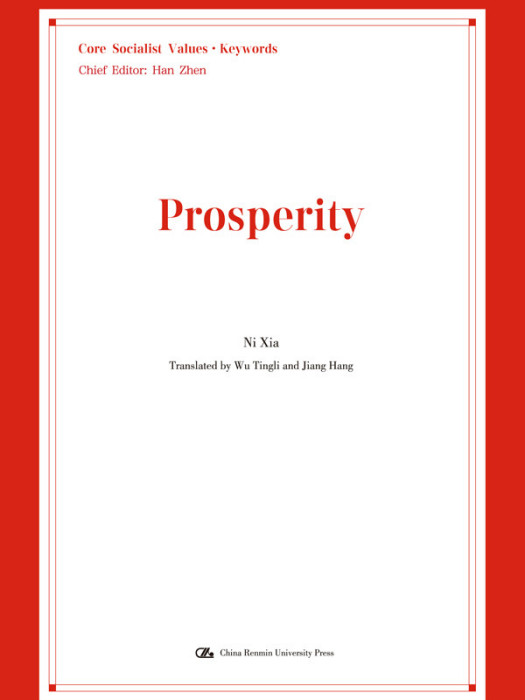在中國傳統典籍中,“富”,指資產財物豐厚,即“豐於財”,“多財曰富”; “強”,本義是“弓有力”,引申出“壯盛”的意思。雖然在儒家典籍中“富強”或者“富”、“強”出現的頻率並不高,但人們對富裕、富足生活的嚮往很早就存在。如在我國第一部史書、古代世界著名的歷史典籍之一《尚書》中的“裕民”、“惠民”等,表達的是古人對富裕、富足生活的嚮往,對國家富強、強盛的要求。為了實現富強之夢,一代又一代的中華兒女勵精圖治,奮發圖強,創造了一個又一個輝煌盛世。自西周的成康之治開始,歷經兩漢等朝的文治武功,唐宋時期達到極盛。“小邑尤藏萬家室,稻米流脂粟米白,公私倉廩俱豐實”(唐·杜甫:《憶昔》)就是這一盛景的最好寫照。
基本介紹
- 書名:富強(英文版)
- 作者:韓震 倪霞
- ISBN:9787300207582
- 定價:118.00
- 出版社:中國人民大學出版社
- 出版時間:2015-3-1
- 裝幀:平裝
- 開本:1/16
內容簡介······
目錄······
Section one Elaboration of Prosperity from the Origin
Section two Prosperity: A Thousandyear Dream and UnremittingPursuit
Chapter Two Prosperity and Strength:A Wonderful Dream and Centuryold Anticipation of the Chinese Nation
Section One Glory of the Chinese Nation
Section Two Poverty and Weakness since Modern Times
Section Three The Communist Party of China Has Set A New Modelfor Prosperity and Strength of the Chinese Nation
Chapter Three Prosperity and Strength: An Essential Requirement of Socialism
Section One Socialism Shall Create Higher Productive Forces
Section Two Socialism Can Create Productive Force Higher thanThat of Capitalism
Section Three Realization of Common prosperity is the Biggest Superiority of Socialism
Chapter Four Contemporary China Is Advancing on the Road towards Prosperity
Section One Reform and Opening up Is the Key Choice Determining Destiny of Contemporary China
Section Two Great Achievements since the Reform and Opening up
Section Three Proceed on Broad Road Leading to Prosperity
Chapter Five Realization of the Chinese Dream of Prosperity and Power
Section one Adhere to Confidence in Three Aspects
Section Two Upholding Four Tasks

